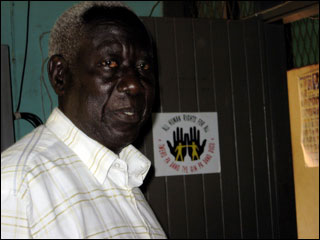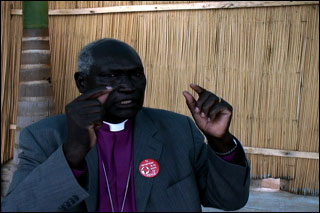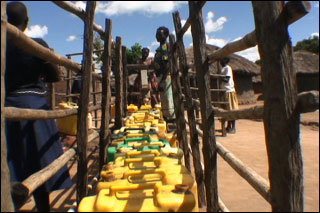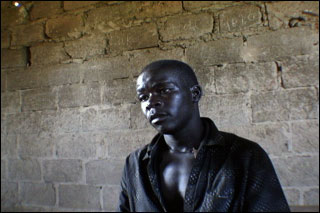
Stopping an insurgency isn’t easy.
That’s the lesson in northern Uganda, home to Africa’s longest running conflict, where a rebel group called the Lord’s Resistance Army (LRA) has been fighting the Ugandan government since 1986.
For years, the war, which has claimed an estimated 100,000 people and displaced more than a million, has defied mediation attempts.
But peace talks are under way here, and there is renewed hope that the most recent negotiations in Juba, Sudan, can end the war for good.
There is only one problem.
Of all the issues on the table, including the disarmament of rebels and reparations for victims, the main sticking point revolves around arrest warrants against four of the top LRA commanders, including its leader and self-declared prophet, Joseph Kony.
There are many Ugandans, including most of the war’s victims, who believe the warrants issued by The Hague (The Netherlands)-based International Criminal Court (ICC) will hurt the negotiations at a time when peace finally seems within reach.
Recently, Vincent Otti, second-in-command of the LRA and also named in the indictment, told Reuters that the war will continue as long as the ICC presses its case.
In camps for displaced persons in northern Uganda’s Gulu District, there is a near unanimous chorus from the war’s victims. When asked, they say peace will not come until the arrest warrants are retracted.
“I think that the ICC is making a lot of problems here,” said 17-year-old Ronaldo Otto, whose parents were killed by the LRA. He now lives at the Awoch IDP camp in squalid conditions with 14,000 others. “We need to forgive the LRA leaders so that the peace talks continue, because if we decide to punish them, I know the peace talks will fail. The LRA will start [attacking] us very seriously. So what I want is forgiveness.”
But that doesn’t sit well with international observers and many human rights groups, which argue that formal justice is vital to a lasting peace, and want to see the fledgling ICC establish itself.
“In northern Uganda’s 21-year-conflict, horrific crimes have been committed,” said Richard Dicker, director of the International Justice Program at Human Rights Watch in a statement on May 30, 2007. “Fair and credible prosecutions with appropriate penalties will tell would-be perpetrators that no one is above the law, thereby helping to promote a peace that is durable.”
The ICC is unlikely to pull out now, said Eric Stover, director of the Human Rights Center at the University of California, Berkeley, which is preparing a report from the region on this issue.
But if the ICC did withdraw, said Stover, “Kony and the leaders of the LRA, who have committed up to 37,000 abductions, could get away with murder. The question is: Do people want peace without any justice? And do they understand what exactly the ICC is? Do they understand that it’s not the rank-and-file [soldiers] that people in northern Uganda want home who will be prosecuted, but the top LRA leaders?”
One of the ICC’s first cases, northern Uganda is emerging as a critical test of the court’s legitimacy.
But Human Rights Focus, a Gulu-based human rights organization, says the ICC intervention here is arbitrary.
“I’ve told the ICC, they should deal with those recalcitrant countries like the U.S. who don’t want to be under the armpit of the ICC, not a banana republic like Uganda,” said James A.A. Otto, executive director of the group. The U.S. is a not a signatory to the ICC and is exempt from prosecution, he noted.
Otto also argued that the ICC is biased because it is not prosecuting the alleged human rights violations committed by the Ugandan military, the Uganda People’s Defense Force (UPDF).
But the people of northern Uganda seem unconcerned with any nuanced questions of international justice. They feel they have suffered enough and just want the ICC to go away.
Those living in the war torn area say the ICC arrest warrants provide a disincentive for LRA rebels to come out of the bush and stop fighting.
“Now there is no way the rebel leaders can be punished,” said Yafes Okot, a 30-year-old former rebel who was forced by his commanders to butcher others who tried to escape. “If they know they will be punished and are asked to come out of the bush for peace talks, they won’t come. What else can be done?”

Retired Anglican Bishop Baker Ochola, former vice president of the Acholi Religious Leaders’ Peace Initiative, believes the ICC is only concerned with international legitimacy, not with healing a shattered community.
“Real justice is not punishment,” said Ochola, who lost his wife to an LRA landmine. Instead of the ICC’s arrest warrants, Ochola and many other Ugandans support more traditional mechanisms of peace, including a truth and reconciliation commission and tribal justice ceremonies.
“Real justice is not killing someone because someone has killed your child, because now you’re becoming a killer just like him or her,” said Ochola. “So for us, we bring a different perspective: We are not going to kill you. We’re going to give you back your life. That’s the difference. Truth, mercy, justice, and peace must stand together.”
The local tribal justice systems help to rebuild the relationships between the perpetrator and the victim through reconciliation ceremonies, he said. One such ceremony is the Mato oput, a system of truth-telling followed by a series of ceremonial gestures like slaughtering livestock, sharing a meal, and drinking from the same cup.
Such systems stress forgiveness over punishment and accountability. But given the extent of massacres, maiming, and forced abductions by the LRA, Kony and his top commanders have a lot to account for.
“A culture of impunity should not be encouraged anywhere in the world for those who commit war crimes against the population,” said Lt. Col. Francis Achoka Ongom, Civil Military Relations Officer for the UPDF, whose duties include the protection of civilians in conflict areas. “That is why [the government] sought help from the ICC, so that the ICC could help the government solve this problem.”

But now, even the Ugandan government is sending mixed signals about its preference for the court. After initially inviting the ICC, the government recently signed a peace agreement with the rebels acknowledging that “the national legal and institutional framework provides a sufficient basis for ensuring accountability and reconciliation.”
In other words, Uganda can take care of itself.
In the coming weeks, the Ugandan government may request that the ICC abandon its prosecution of the LRA rebels.
If that occurs, the court will have to make a difficult decision: It can ignore the request, continue to pursue the prosecutions, and risk prolonging the war, thereby losing legitimacy in the eyes of the victims.
Or the court can abandon the prosecutions, and lose legitimacy in the eyes of international observers.

- Follow us on Twitter: @inthefray
- Comment on stories or like us on Facebook
- Subscribe to our free email newsletter
- Send us your writing, photography, or artwork
- Republish our Creative Commons-licensed content

